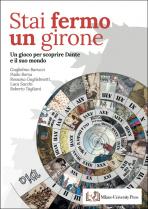Authors
Guglielmo Barucci; Paolo Borsa; Rossana Guglielmetti; Luca Sacchi; Roberto Tagliani
Keywords:
Dante Alighieri, Italian Literature, Board Game, Dante Studies
Synopsis
“Stai fermo un girone” (skip a turn in hell) is a game based on the “Game of the Goose”, a traditional children’s board game. It is dedicated to Inferno by Dante Alighieri, and to all humanities research focused on the Middle Ages.
To advance along the board, and to win the game, one must not only have a certain familiarity with cantos, characters, and themes of Dante’s Inferno, but must also be able to tackle different modes of enquiry for the texts used in university studies. In so doing, one can unlock a door through which to view Dante’s work, set against the backdrop of the Middle Ages, with its history, ideas, culture, questions raised, and answers given. This board game will help stimulate and further the understanding of secondary school students encountering Dante’s verses for the first time. It’s also a fun way for aficionados to relive and revisit a beloved writing. Thanks to its three levels of difficulty, the game is suitable for persons of all skill levels, from novices to veterans.
The print-cut-play format makes it easy for everyone to build their own set of cards, markers and board, and to immerse themselves in the world of Dante and his Inferno.
Downloads
Download data is not yet available.
Author Biographies
Guglielmo Barucci
teaches Italian Literature at the University of Milan. His research focuses on Dante and the Renaissance. On Dante, he published a book (2012) dedicated to the poet’s dreaming in Purgatorio, and he has authored a number of articles, primarily on Dante’s literary and critical resurgence in the nineteenth century. He has tackled a number of different facets of the Renaissance, from historiography (his 2004 work on Guicciardini, in particular) to correspondence as a literary form (a monograph in 2009), from lyric poetry (a Tasso Prize-winning essay), and the “language question” (as editor for two works by Niccolò Liburnio in 2005), to research on Aesop’s fables. Prof Barucci’s recent research has focussed on epic poetry.
Paolo Borsa
teaches Italian Literature for the Italian Department at the University of Fribourg in Switzerland. Prof Borsa is a researcher with the Centre for Medieval Literature in York and Odense, and is co-editor-in-chief of the journals “Interfaces: A Journal of Medieval European Literatures” and “Rassegna europea di letteratura italiana”. Besides Dante, his main lines of research include early Italian literature, and eighteenth- and nineteenth-century Italian literature. In Fribourg, he spearheaded a project entitled “Ugo Foscolo, Epistolario 1825-1827”, funded by the Swiss National Fund (for which he was recently appointed “Open Access Ambassador”).
Rossana Guglielmetti
teaches Medieval Latin Literature at the University of Milan. Her main area of research is the study of how Medieval Latin texts were handed down, as well as their critical editions. Her publications include commentary on the Canticle of Canticles by Gilbert of Stanford, Alcuin and Justus of Urgell (works published in 2002, 2004 and 2011, respectively), Navigatio sancti Brendani (a 2014 editio minor and a 2017 editio maior), Latin texts from the Saibante Codex (2019), Visio Godeschalci (2021), studies on the tradition of Policraticus by John of Salisbury (in a book published in 2005, and in more recent articles) and on patristic and early Medieval exegetic writings, a catalogue of hagiographic codices of the Biblioteca Laurenziana (2007) and the Latin dossiers of certain martyrs. Currently, her research is focussed on the trope of visions of the hereafter in the Latin Medieval period.
Luca Sacchi
teaches Romance Philology and Linguistics at the University of Milan. Prof Sacchi focusses on Romance fiction, especially that stemming from late antiquity and the classical period, and has researched various Italian prose and verse adaptations of the Apollonius of Tyre novella (Historia Apollonii regis Tyri. Volgarizzamenti italiani, 2009). He has also dedicated various studies to the vernacular encyclopaedia tradition of the Iberian and Gallo-Romance region, comparing texts which share a common dialogical structure (Le domande del principe. Piccole enciclopedie dialogiche romanze, 2009); for the Castilian region, he concentrated on the post-Alphonsian era, studying the Libro del Tesoro, the Gran Conquista de Ultramar and the Lucidario of Sancho IV of Castile, of which he is working on a critical edition. He contributed to the book entitled Il manoscritto Saibante-Hamilton 390. Edizione critica, (2019), with a focus on the works of Uguccione of Lodi and the Pseudo Uguccione.
Roberto Tagliani
teaches Romance Philology and Linguistics at the University of Milan. Prof Tagliani has authored numerous essays on topics ranging from the dissemination of Arthurian literature in France and Italy, to the Medieval French novel, through to the religious-educational canon of the late Northern Italian Medieval period. He edited the annotated edition of Tristano Corsiniano (2011) and coordinated the annotated edition, by a team of scholars led by Maria Luisa Meneghetti, of the Hamilton 390 manuscript (formerly known as the Saibante manuscript) at the Staatsbibliothek zu Berlin (Rome, Salerno Editrice, 2019).
Published
December 20, 2021
Copyright (c) 2021 Author(s)


